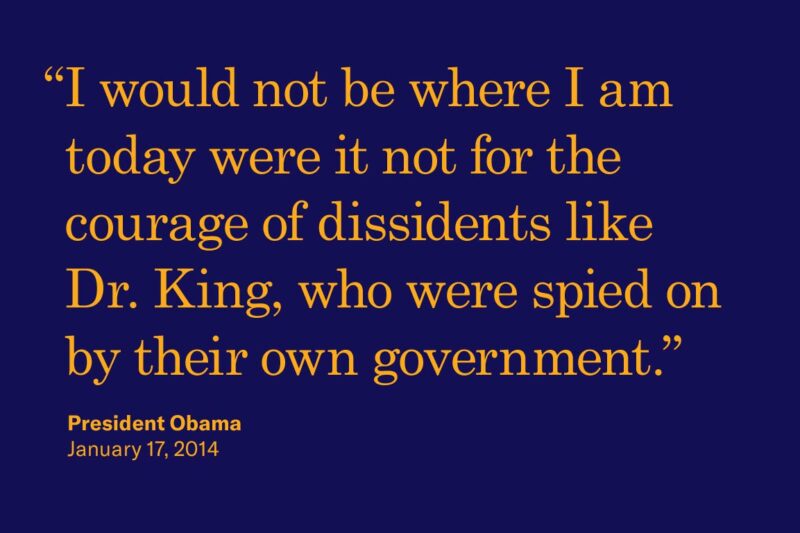
Last week, Martin Luther King, Jr. would have celebrated his 85th birthday in an America that, in myriad ways, is a freer, fairer, and more just nation than the one he knew. Today, we pause to remember the man for daring to of equality of personhood and opportunity; for having the courage to transform what he called “the jangling discord of our nation into a beautiful symphony of brotherhood”; and — as President Obama so lyrically last year — for giving a “mighty voice to the quiet hopes of millions” and offering a “salvation path for oppressed and oppressors alike.”
The example of Dr. King’s life, and the progress it inspired, is one with which we must continuously reengage in order to sustain and advance his work.
But the lessons of Dr. King’s life and legacy don’t stop there, and President Obama’s announcement last week that he will seek to end the government’s collection of Americans’ phone records is a welcome first step toward honoring another important but oft-forgotten part of Dr. King’s story: our government’s obsessive campaign of surveillance of his private life, as part of the FBI’s shameful COINTELPRO program.
That experience shows us how threatening unchecked government surveillance powers are to our democracy — and to our future Dr. Kings — and makes clear the imperative to put an end to the abusive NSA practices we’ve learned about in the past seven months. And the president acknowledged that danger in his speech: “Indeed, during the course of our review, I have often reminded myself that I would not be where I am today were it not for the courage of dissidents, like Dr. King, who were spied on by their own government.”
A few months ago, I wrote about that campaign and its connection to the vast domestic spying on ordinary Americans undertaken by J. Edgar Hoover’s FBI:
The FBI viewed no space as off limits. The agency consistently bugged King’s hotel rooms to monitor his planning of the 1963 March on Washington and to keep tabs on his strategic partnerships with other civil-rights leaders. But it also sought to compile a dossier of embarrassing information about King’s private sex life that the government could (and did) employ to discredit King and obstruct his political efforts.
King was not alone on the government's long list of targets; he with boxer Muhammed Ali, humorist Art Buchwald, author , and even Senator Howard Baker. But the greater scandal was that — as the Church Committee revealed in 1976 — these big names appeared alongside more than one million other Americans, including half a million so-called "subversives."
Back then, it took the Church Committee to that American “intelligence agencies ha[d] regularly collected information about personal and political activities irrelevant to any legitimate government interest,” precipitating a national effort to restore to Americans the full extent of privacy guaranteed by the Constitution. But the Church Committee’s report did not spring from a vacuum: It was only possible because of some extraordinary feats of democratic citizenship, and a reporter’s dogged under a new statute called the Freedom of Information Act.
Seven months ago, another bold act — Edward Snowden’s — made plain to Americans that domestic spying on the most intimate details of our lives is no bygone piece of history. In the time since Snowden’s initial revelations, the ACLU has accelerated its long-running fight on behalf of all Americans to end the domestic surveillance state. In the wake of the president’s speech, that fight continues in both Congress and the courts.
Just more than 50 years ago, at a time of intense public debate and facing the tangible prospect of seismic political change, a 34-year-old Dr. King stood on the National Mall and warned Americans that “it would be fatal for the nation to overlook the urgency of the moment.” Today, amidst another remarkable debate about the fabric of the American political project that presents us with the opportunity for change, the nation should remember these words in particular — among the many that made Dr. King one of our country’s most inspiring catalysts of progress.
Learn more about government surveillance and other civil liberties issues: Sign up for breaking news alerts, , and .

